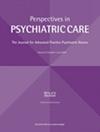The Relationship of Hedonic Hunger and Night-Eating Symptoms with Difficulties in Emotion Regulation in Young Adults
IF 1.9
4区 医学
Q2 NURSING
引用次数: 0
Abstract
Purpose. This study aimed to examine the association between hedonic hunger and night-eating syndrome (NES) with difficulties in emotion regulation (DER) among young adults. Design and Methods. This cross-sectional, descriptive study was conducted on a voluntary basis at a private foundation university, involving a total of 1010 students enrolled in the 2020-2021 academic year. Data were collected through an online application of an information form, which assessed demographic characteristics, the Power of Food Scale (PFS), the Night-Eating Questionnaire (NEQ), and the Difficulties in Emotion Regulation Scale-Short Form (DERS-16). The data were analyzed using IBM SPSS26® software. Findings. Women made up 80.4% of the students in the study. The mean age was 21.58 ± 2.98 years, and the mean body mass index (BMI) was 22.06 ± 3.71 kg/m2. The results indicated that 68.1% of the students reported hedonic hunger and 88.7% had NES. Moreover, DER was found to be more prevalent among women (p=0.031). In addition, the DERS-16 score increased by 6.5% (p=0.040) with each increase in age and by 6.8% (p=0.031) with each increase in BMI. Furthermore, the total PFS score increased by 32.5% (p<0.001), and the total NEQ score increased by 22.4% (p<0.001), corresponding to an increase in the total DERS-16 score. Practice Implications. These findings suggest that an increase in the difficulties experienced in emotion regulation is associated with higher levels of hedonic hunger and night-eating tendencies among young adults.享乐性饥饿和夜食症状与青少年情绪调节困难的关系
研究目的本研究旨在探讨享乐性饥饿和夜食综合征(NES)与年轻人情绪调节困难(DER)之间的关联。设计与方法。这项横断面描述性研究在一所私立预科大学自愿进行,共有1010名2020-2021学年的在校学生参与。数据通过在线申请信息表收集,该表评估了人口统计学特征、食物力量量表(PFS)、夜食问卷(NEQ)和情绪调节困难量表-简表(DERS-16)。数据使用 IBM SPSS26® 软件进行分析。研究结果女性占研究学生的 80.4%。平均年龄为 21.58 ± 2.98 岁,平均体重指数(BMI)为 22.06 ± 3.71 kg/m2。结果表明,68.1%的学生有享乐性饥饿感,88.7%的学生有非享乐性饥饿感。此外,DER 在女性中更为普遍(P=0.031)。此外,DERS-16 分数随年龄的增加而增加 6.5%(p=0.040),随体重指数的增加而增加 6.8%(p=0.031)。此外,PFS 总分增加了 32.5%(p<0.001),NEQ 总分增加了 22.4%(p<0.001),与 DERS-16 总分的增加相对应。实践意义。这些研究结果表明,情绪调节困难的增加与年轻人更高水平的享乐性饥饿和夜食倾向有关。
本文章由计算机程序翻译,如有差异,请以英文原文为准。
求助全文
约1分钟内获得全文
求助全文
来源期刊
CiteScore
5.00
自引率
4.30%
发文量
139
审稿时长
>12 weeks
期刊介绍:
Perspectives in Psychiatric Care (PPC) is recognized and respected as THE journal for advanced practice psychiatric nurses. The journal provides advanced practice nurses with current research, clinical application, and knowledge about psychiatric nursing, prescriptive treatment, and education. It publishes peer-reviewed papers that reflect clinical practice issues, psychobiological information, and integrative perspectives that are evidence-based. Perspectives in Psychiatric Care includes regular columns on the biology of mental illness and pharmacology, the art of prescribing, integrative perspectives, and private practice issues.

 求助内容:
求助内容: 应助结果提醒方式:
应助结果提醒方式:


